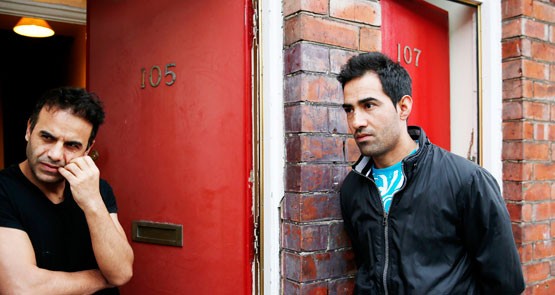
Afghan asylum seekers stand outside their red front doors in Britain
In Cardiff, Wales, a private company providing housing insists asylum seekers wear brightly coloured wristbands, even though they make the men a target for abuse.
In Middlesborough in northern England, the doors of properties allocated to asylum seekers are painted bright red. Racists throw bricks and eggs through the windows, smear the houses with excrement and paint anti-immigrant graffiti on the walls.
In the German town of Bornheim, a public swimming pool bans male asylum seekers; in Rheinsberg, authorities cancel an annual parade, blaming the presence of refugees in a nearby suburb.
In Denmark, the minority Liberal Party government combines with the Social Democrats and the anti-refugee Danish People’s Party to pass legislation under which jewellery and other valuables will be seized from asylum seekers to cover the cost of their stay. The legislation mimics similar schemes introduced in Switzerland and parts of Germany.
In the 1930s, Hannah Arendt declared that freedom of movement should be understood as the basis of all other freedoms, “the oldest and also the most elementary”.
Writing during the refugee crisis spurred by Hitler’s persecution of the Jews, she argued:
“Being able to depart for where we will is the prototypal gesture of being free, as limitation of freedom of movement has from time immemorial been the precondition for enslavement. Freedom of movement is also the indispensable precondition for action, and it is in action that men primarily experience freedom in the world.”
You can see what she means. If Western liberals obsess more about speech than movement (Je suis Charlie, rather than Je suis Aylan), it’s because they take for granted an ability to go just about anywhere they like. Yet if you can’t escape danger, you won’t be speaking for long.
The identification of a “right” removes any obligation on the person claiming protection. A right to free speech means you can say what you want. It’s the state that’s constrained, not you — it’s compelled to let you speak your piece.
That’s the distinction between privileges and rights. Privileges place the onus on you but rights place an onus on others.
The international treaties on asylum were codified in the wake of the Judeocide underway in Arendt’s time. Even now, the moral weight of the Holocaust — the shame attached to those nations that sent families back to die in Hitler’s camps — prevents governments from abandoning the refugee convention altogether. They can, however, manoeuver — both legally and politically — to avoid its requirements.
That’s the significance of the rash of petty distinctions between citizens (those to whom obligations are recognised) and outsiders (to whom rights don’t apply). By making refugees pay for their accommodation with whatever valuables they’ve smuggled from their homeland, governments transform the symbolism of asylum. It’s no longer the granting of a right. Rather, it’s presented as the bestowing of a privilege, a favour extended under certain circumstances — and favours, of course, can always be withdrawn.
A few weeks ago, Louis A. Coutts from the International Commission of Jurists published a piece about the basis on which Australian courts legitimated the detention without trial or charges of those pursuing a legal right to claim asylum. “The High Court,” she says, “has determined that imprisonment can only be imposed by a properly constituted court. How is it then that [asylum seekers] can be in the closest and awful detention when they have not had access to a court?”
Her article outlines the legal reasoning. The political basis is, however, entirely obvious: the distinction between those to whom rights apply and those to whom they increasingly don’t.
“[N]obody wants to know,” wrote Arendt of the refugees of her day, “that contemporary history has created a new kind of human beings — the kind that are put in concentration camps by their foes and internment camps by their friends.”
She would find the present climate depressingly familiar.








” the shame attached to those nations that sent families back to die in Hitler’s camps ”
Which nations were those, Jeff? Starting with your own backyard, or sections there of, might be a good place to start.
Great article BTW.
It’s interesting to find Crikey pointing out the problems which arise from foreigners flooding into prosperous Nations, but doing so oblivious for the important lessons Western Democracies need to learn from all this.
Geoff Sparrow: that Europe’s Jews, along with other ethnic minorities, suffered unspeakable horrors in WW2 cannot be disputed.
However, why are crucial contributing events such as global Jewry’s 1932 declaration of economic war against the already severely financially damaged German nation, never mentioned in the MSM. At that stage, the German Government was targeted by global Jewry for having the cheek to eject those international bankers from the German economy who were considered to be profiteering on Germany’s weakened post WW1 economy. Ordinary German Jews were not targeted.
You also say:
“Even now, the moral weight of the Holocaust — the shame attached to those nations that sent families back to die in Hitler’s camps — prevents governments from abandoning the refugee convention altogether”.
What ‘moral weight’ & which governments are you referring to?
KevH – wow, I better dig out my old Protocols.
Vintage stuff – “global Jewry’s 1932 declaration of economic war against the already severely financially damaged German nation” & “targeted by global Jewry“.
Sparrow, there is no equivalency between the wristlets and the stars & triangles you evoke.
They are a privilege, allowing unfettered access to food, shelter & assistance.
I can think of a few areas of Oz that would benefit from such largess.
Do we know that the doors were painted red to identify refugees or was it just that the houses were renovated for refugees and the doors happened all to be painted red? If they had been painted different colours presumably the newness of the paint would have identified them as refugees Surely the intention of the painters is relevant here and perhaps the author could have discovered the reason the doors were painted red.
There’s an awful lot of assumptions about the putatively invidious intentions of those who painted the doors (any colour at all) and the reasons for the wristbands.lf food is to be provided what other measures does the author suggest that would identify those to whom food is available and that could not be sold or passed on to others and what colour should the doors be painted or should they not be painted at all but intentionally distressed.
My instinctive response to such complaints is sure, if someone comes to my door asking for life-saving aid I owe it to him or her to provide it but once they start complaining about the quality of the aid provided, my charitable feelings are somewhat diminished.